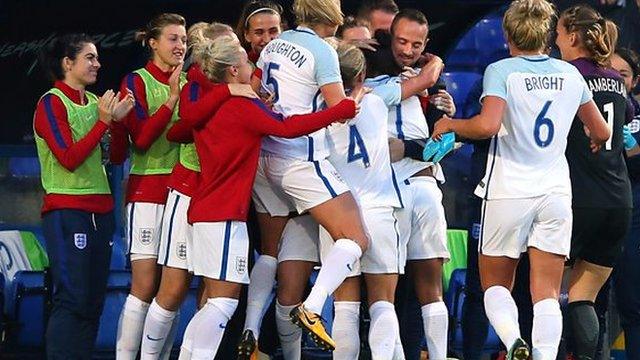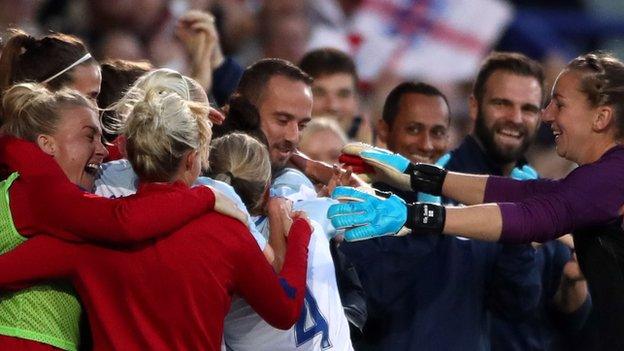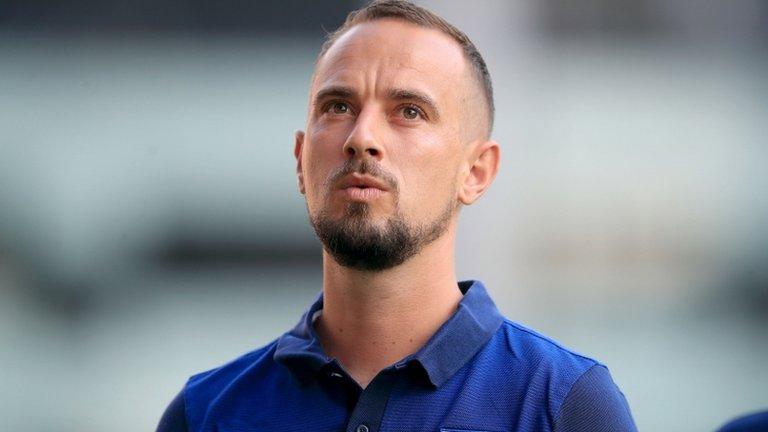Mark Sampson sacked as England women's manager
- Published
FA chief executive explains Sampson sacking
Mark Sampson has been sacked as England women's manager following evidence of "inappropriate and unacceptable" behaviour with female players in a previous role.
The Football Association says that last week it was made aware of the full details of safeguarding allegations made against Sampson in 2014 relating to his time as Bristol Academy manager.
A 2015 FA assessment found Sampson did not pose a risk.
Sampson was also cleared this year of wrongdoing following discrimination allegations made by England players, including Chelsea and England striker Eniola Aluko.
The 34-year-old Welshman became England head coach in December 2013 after leaving top-flight side Bristol Academy, now renamed Bristol City Women.
The FA statement said: "The full report of that [2014] investigation was only brought to the attention of the current FA leadership last week.
"It is our judgement that it revealed clear evidence of inappropriate and unacceptable behaviour by a coach. It is on this basis that we have acted quickly to agree a termination of Mark's contract."
Women In Sport announced, external Sampson had been removed as patron of the charity following the FA decision.
'It's a difficult decision'
FA chief executive Martin Glenn, speaking to BBC Sport's Richard Conway
Why have you taken this decision today?
In 2014 there were concerns raised about Mark's time at Bristol Academy. These were investigated by the FA's safeguarding unit and Mark was cleared in terms of his suitability to continue in football in early 2015.
Let's be clear, Mark is not deemed to be a safeguarding threat in football. The problem is that when I read the full report of that just last week, the issue became one of Mark's conduct and it's really around the boundaries between a player and a coach.
On reading that report, I felt that what I saw was incompatible with the standards that we'd expect for someone to work at the FA.
Many people will look at this and perhaps think this is a convenient way to get rid of Mark Sampson given the ongoing scrutiny he is under over Eni Aluko's allegations - what do you say to that?
I can understand why people would say that but they are two very different things.
The concerns Eni Aluko raised were about perceived bullying and perceived racism. We have investigated those properly, there have been two separate investigations actually which have broadly concluded there's no systematic evidence for that.
This is a different issue, this is about his conduct before his time at the FA which we judge just isn't consistent with the standards that an FA employee needs to show.
Is Mark Sampson fit to work as a coach in football generally in your opinion?
Mark Sampson is absolutely clear to work as a coach in football.
But you don't think it's appropriate to work as the England coach when he can work elsewhere?
I think that's for other people to make their mind up. In terms of the standards we set at the FA and what we know about what happened, we are very clear about our decision.
'This situation is a mess'
A spokesman for Bristol Academy said: "In 2014 the club was made aware of the FA's investigation into allegations surrounding Mark Sampson.
"Bristol Academy Women co-operated fully with that investigation, which found that Mark Sampson did not pose a safeguarding risk working in the game. The club has had no further contact from the FA on this subject in the intervening years."
Minister for Sport Tracey Crouch said: "This situation is a mess and raises very serious questions about whether the historic processes that the FA had in place around the recruitment of coaches were appropriate, for something like this to have been missed.
"The FA are right to have taken action but reassurance is needed to make sure this does not happen again at any level of coaching."
Sampson's England side beat Russia 6-0 in a World Cup qualifier on Tuesday and he led the Lionesses to successive semi-finals at major tournaments.
Last year Sampson signed a new contract to remain in charge until 2019. He has had his contract paid up in full by the FA.
I'm not a racist - Sampson
How we did we get here?
December 2013: Sampson becomes England manager having left Bristol Academy
Early 2014: Complaint against Sampson made relating to his time at Bristol
March 2015: FA safeguarding review panel concludes investigation and in October 2015 he is cleared to continue working in football.
May 2016: England forward Eniola Aluko is asked to participate in a cultural review of all England teams by the FA's technical director Dan Ashworth.
December 2016: An independent investigation, led by barrister Katharine Newton, hears Aluko's claims that during a meeting in 2015, Sampson made a "highly inappropriate remark".
March 2017: The independent review clears Sampson and his staff of wrongdoing but it is understood that Aluko was paid £80,000 in a confidentiality agreement.
13 September 2017: FA says it received the full safeguarding review panel report on the allegations against Sampson.
14 September 2017: The FA says it could re-open its investigation into racism claims against Sampson after further evidence is submitted.
20 September 2017: Sampson sacked by FA
FA investigation
Last week, the FA announced it was to re-open its investigation into separate discrimination claims against Sampson, first made in 2016.
Sampson was alleged to have asked mixed race England midfielder Drew Spence whether she had been arrested during a tournament in 2015, a claim which he denied.
Eniola Aluko spoke to the BBC about Sampson claims in August
The claim was first made by Spence's England and Chelsea team-mate Aluko, and Spence has now submitted written evidence to support it.
In a further separate allegation, Aluko said Sampson told her to make sure her Nigerian relatives did not "bring Ebola" to an England game at Wembley in 2014.
Two investigations - one internal FA inquiry and one independent review led by barrister Katharine Newton - cleared Sampson of any wrongdoing.
Senior FA executives are set to face a parliamentary inquiry over the investigations after Aluko initially raised a "bullying and harassment" grievance against Sampson in response to an internal cultural review.
Aluko, who has 102 caps and is a qualified lawyer, and fellow England forward Lianne Sanderson have been invited to give evidence to the select committee hearing planned for mid-October.
Celebration was a statement - Nikita Parris

Aluko, who scored 33 goals in 102 games, added that she was content to be out of the England set-up
Support for Sampson
England captain Steph Houghton came out in support of her head coach earlier in September but said the allegations had "hit the squad very hard".
"Since Mark has been in charge I've enjoyed every moment," Houghton, 29, told BBC Sport.
Meanwhile, on the eve of England's opening World Cup qualifier against Russia, striker Jodie Taylor said the squad had been brought "together" by the allegations.
Former England women defender Alex Scott told BBC Radio 5 live that Sampson had "the most open-door policy" she has ever experienced.
Scott, who is of mixed race and played 140 times for England, added: "If anyone ever had a problem he was open to new ideas."
Who's next to coach England?
Tom Garry, BBC Sport
Not only for his recent success at Manchester City, but for his desire to bring through English players, Nick Cushing will be a strong candidate, having won the WSL title in 2016 and the Women's FA Cup in May with a squad built largely with Lionesses.
Chelsea Ladies boss Emma Hayes is the most successful current female boss in the WSL, winning the double in 2015 and the Spring Series in June, but she can be outspoken and may not see eye-to-eye with all at the FA.
Reading boss Kelly Chambers is popular with many current Lionesses, while former Arsenal boss Laura Harvey - currently head coach of Seattle Reign - would be viable, along with ex-Leeds boss Gemma Grainger - part of Sampson's coaching team.
Alternatives include the current Canada women national team boss John Herdman - from County Durham - who has earned good credit for lifting Canada up to fifth in the world, while Englishman Colin Bell won the 2014-15 Champions League with Frankfurt.
You can now add WSL 1 alerts for goals and results in the BBC Sport app.
- Published20 September 2017

- Published19 September 2017

- Published15 September 2017
